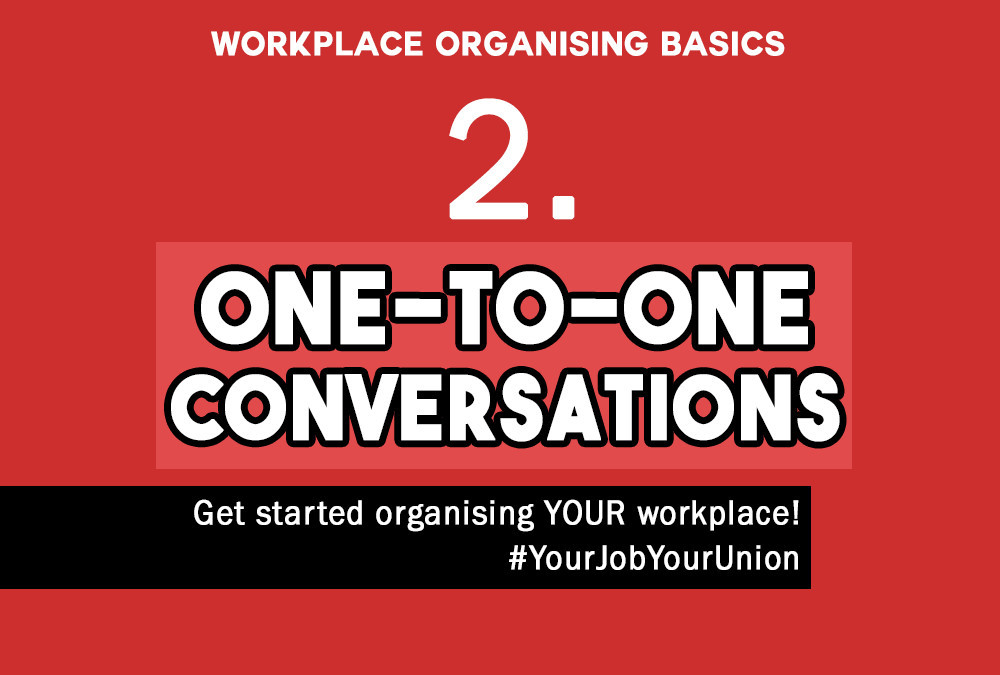Forming relationships with workmates is the backbone of organising. This next piece in our mini-series about workplace organising is all about one-to-one conversations. Listening to your workmates, learning about the issues, and guiding them into taking action!
Why are one-to-one conversations the best way to talk to workers?
1) Everyone has their own ideas and their own specific issues. You will only find out by asking them directly. If you only discuss these things in a group setting, some people will dominate and others will not be heard.
2) One-to-one chats are secure. You have control over the conversation, you can give out sensitive information at your discretion. It is better to find out that someone is the boss’ cousin in a one-to-one conversation than at a mass organising meeting later!
3) If you start with a mass meeting or a flyer, you will alert the boss right away. They will start their union-busting activity before you have had a chance to lay the groundwork. The one-to-one approach means that things progress at your pace.
Who should you have one-to-one conversations with?
This can be different in each context, but you could start with the influential workers and/or those who you think are most keen. If you have started mapping your workplace and you have a grasp on the main social networks, the information that you have gathered so far should help a lot when deciding who to talk to.
However, you might find it a lot easier to start with colleagues who you get along well with. This is certainly best if you are a bit nervous about the prospect of talking to other colleagues, it will help to boost your confidence and give you practice.
When and where should you have one-to-one conversations?
We recommend that you try to have a predetermined meet-up after work, or make the most of an unexpected opportunity you get out of work hours. For instance, maybe your child goes to football practice one a week and you sometimes bump into a colleague with their child there? You may be able to squeeze in a ten minute chat in the car-park while you both wait for the kids to finish up.
It is also very common, however, for these one-to-one conversations to happen at work, in small chunks over a couple of weeks. Ultimately, it comes down to what is easiest and most convenient for you both. If you do have these conversations at work though, BE DISCREET! You do not want to have anyone overhear you. If you have been ‘charting’ the workplace, your map will reveal some useful spots to have conversations, as well as some bad spots (not near open windows or on stairwells!)
What should you say?
This is where Agitate, Educate, Inoculate, Organise, Unionise comes in! This is NOT proselytising about the “historical righteousness of labour’s cause,” or converting someone to a specific political ideology. Quite the opposite; you want to know exactly where your co-worker is at. You want to know what they are angry about and guide them towards the positive idea that we have the power collectively to solve any problem.
A vital skill to develop is active listening. Remember the 80/20 rule: 80% listening, 20% responding.
AGITATE: Find out what the worker’s grievances and issues are. What makes them angry? Ask further questions; how do these problems impact them personally? Collectivise the issues; “you’re not alone, a few of us are annoyed at that too.” They might mention a problem that you have not heard of before. Ask if they know of other workers who are suffering as a result of it?
EDUCATE: Ask your colleague how they think things could be different. What do they think needs to change? Suggest that there are always solutions and if you all stick together you can take collective action to make it better. You should read up on the struggles going on in your industry across country and around the world. Give your co-workers examples of victories.
INOCULATE: All workers are fearful of organising. Be realistic, aware of difficulties and risks. Bosses will lie and try many tactics to stop you, even illegal ones. But if you stick together, if you are disciplined and organised, you will be safer than you would be alone.
ORGANISE: We need doers, give them a task. Have a list of easy, risk-free jobs and ask them to do one; “you’re mates with John, right? Can you ask him about the recent changes to the cleaners’ breaks?” If they do it, they’re a keeper!
And finally, UNIONISE: All workers are stronger and safer in a union. IWW can give advice, education, training, and resources to support workers to take action together. This is a long-term movement and this is how we grow. Bring ’em in!
These are the absolute basics of having one-to-once conversations with workmates. At first they will be awkward and you will make mistakes, but don’t worry, you will get really good at them with practice! Good luck and get chatting!
—
PREVIOUS: workplace mapping.
NEXT: workplace organising team.
Join the IWW and reach out to the organising department and your local branch for support!
